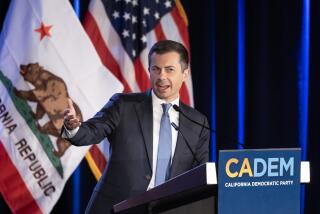GOP Can Boast of Networking the Newest Way--by PCS
- Share via
Bob Dole has one. Newt Gingrich has one. Jack Kemp got one yesterday. Several members of the Secret Service are wielding them, and San Diego Mayor Susan Golding used hers to welcome the 499 other privileged users of a new kind of wireless telephone to the Republican National Convention here Sunday morning.
This week marks California’s introduction to the technology, known as PCS for personal communications services. And the compact, patriotically decorated handsets have become a hot commodity at the convention, which is billing itself as the most high-tech ever.
The scores of digital conversations beaming over the radio spectrum here represent a victory for Pacific Bell Mobile Services, which won the GOP’s endorsement over its wireless competitors and will probably be first to market PCS to the public later this year.
But they also represent a risk. PBMS paid $700 million for its PCS license at a Federal Communications Commission auction last March, and an additional $300 million--so far--building a network extending throughout California and into parts of Nevada.
And as the convention gets underway, with the call volume expected to top 30,000 a day, the phone company’s claim to have all but eliminated the irritating crackle and abrupt cutoffs that so often come with traditional cellular service will be open to national scrutiny.
“We’ve had testers combing every inch of the network for weeks,” says John Baker, vice president of network technology for PBMS. “We’re not going to let it fail.”
The Republican National Committee is also gambling that the new technology will work. Attendees of the Republican convention in Houston four years ago recall it as a telecommunications disaster: The local cellular system was quickly overloaded.
In a PCS network, voice signals are translated in a compressed form using the bits and bytes of computer code--making room for many more conversations on a narrow slice of radio spectrum. The digital technology is more secure, and it also allows data services such as messaging, wireless faxing and Internet access to be integrated with simple voice communication.
Golding’s message, for example, came in the form of an alphanumeric page that could be read on the phone’s mini-screen, like a pager would be.
To meet the RNC’s needs, PBMS built what is thought to be the densest cellular network of its kind inside the San Diego Convention Center. The goal was to make sure that if 250 users hit the “talk” button all at once, all of the calls would go through. The company also aims for a dropped call rate of 1%, compared with 3% and 4% for cellular.
The network itself consists of 76 innocuous-looking large boxes scattered across about 400 square miles that relay the digitized voice and data signals and control the traffic flow. Their placement is subject to complex negotiations with San Diego’s City Council--indeed, PCS builders nationwide have run into problems getting permission for their antennas--and camouflage is key. One, atop a Gold’s Gym here, is painted pink and blue to fit the building’s color scheme.
In San Diego, the worst fate to befall the boxes thus far has been graffiti. In Los Angeles, where the network is about half-done and where the service is expected to be available early next year, people have hacked through the casing to steal the thick copper wires that are part of the antennae system.
“You really have to take a lot of factors into account when you place these things,” Baker says. PCS is now starting to come online around the country, and so far it looks like a hit: Sprint, which launched the first service in Washington, D.C., has garnered 100,000 subscribers in less than eight months from a population base of 8 million.
Pacific Bell is charging 15 cents a minute for use during the convention, and company executives say the price at commercial roll-out will be significantly below cellular competition. Outside the convention center, in the bars of the Hyatt and Marriott hotels, many an ear is pressed to a handset built by Nokia, Motorola or Ericsson. But those who are using the technology to its fullest capacity could be pretty much anywhere.
“I was just leaving the restroom when you called,” said Patrick Garahan, telecommunications guru for the Republican National Committee. “If the object is you can always be reached, any time, anywhere, I think we’ve met that goal admirably.”
Amy Harmon filed this report from her PCS phone. Her e-mail address is amy.harmon@latimes.com.






